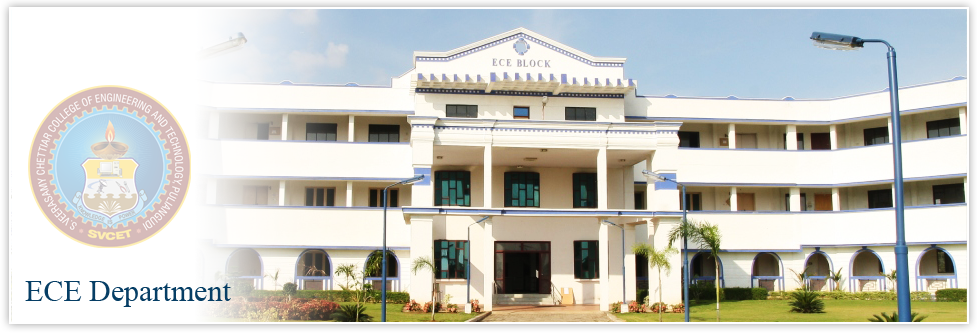
Mission
1. To impart excellent technical knowledge through a state of art environment
2. To offered industry exposure by industrial visits/training
3. To inspire the studetns to work with recent tools and technologies in the research areas
To inculcate the spirit of moral values and ethics to make them good citizens of india

Vision
The Department of CSE will be recognised universally by importing the quality education there by creating talent pool for academia, research and industry so as to have synergetic growth.

Courses Offered
M.E. Applied Electronics
Annual Intake : 18 students
B.E. Electronics and Communication Engineering
Annual Intake : 90 students
Laboratories
The Department has fully equipped Electronics Lab, Microprocessor and Microcontroller Lab, Communication System Lab, VLSI Lab, DSP Lab, and Digital Electronics Lab.
Electronics Lab:
Electronics Lab is equipped with CROs up to 30 MHz, Function Generators up to 20 MHz, Power supplies, various ranges of Voltmeters and Ammeters, Multimeters DRBs, DIBs, and DCBs. In addition, LCR and Components tester are also available.
Electronic Devices:
To expose the students to the basic operation of Diode characteristics, Characteristics of BJT, JFET, Fixed bias amplifier circuits using BJT (used in AM and FM Radio. Our students can design the amplifiers), Differential amplifiers using BJT, Full wave and Half wave rectifiers, Measurement of UJT and SCR characteristics.
Electronic Circuits:
This lab aims to familiarize the student with the analysis and design of feedback amplifiers, oscillators such as Wien-bridge, Hartley and Colpitts oscillators, tuned amplifiers, wave shaping circuits, Multivibrators, blocking Oscillators, Integrator, Differentiator, Clippers, Clampers, Simulation using PSPICE software in Differential amplifiers, Butterworth second order LPF (used in TV receivers), Astable, Monostable, and Bistable Multivibrators, D/A and A/D converters and CMOS Inverters.
Digital Electronics Lab:
Digital Laboratory is equipped with IC trainer kits, IC testers, Function generators upto 1 MHz, CROs up to 60 MHz including Storage Oscilloscope, and all ranges of Power supplies. Various Instrumentation Kits are available in the Laboratory.
Electronic System Design:
Here the students design various electronic systems like DC power supply using buck-boost converters and fly back converters, AC to DC voltage regulator using SCR, Process control timer, AM / FM Modulator and Demodulator and Wireless Data Modem.
Digital Signal Processing Lab:
Digital Signal Processing Laboratory is equipped with TMS320C50 Processor. In addition 5 User Licensed software MATLAB 6.5 versions with all tool boxes are available in the Laboratory. Equipments like 1 GHz Spectrum Analyzer, 25 MHz Digital Storage oscilloscope, 1 MHz Function Generator, 25 MHz CRO, HP Laser Printer and 18 nos. of Higher end System are also available in the Laboratory.
Networks Lab:
The aim of this lab is to introduce the concept, terminologies and technologies used in modern data communication and computer networking in PC to PC communication both in parallel and serial, Ethernet LAN protocols, Token bus and Token Ring protocols, Wireless LAN Protocols Go-back N protocols and selective ret protocols.
Microprocessor & Micro Controller Lab:
Microprocessor Lab is equipped with 8085, 8086, 8051 microprocessor & microcontroller kits. Interfacing circuits with real world applications are also available in the Laboratory. In addition, development tools like In-circuit Emulator, Logic Analyzer and EPROM Programmer are available. Software’s available include driver software, assemblers and disassemblers for microprocessors & microcontrollers.
Communication Systems Lab:
Communication Lab is equipped with Analog & Digital Storage Oscilloscopes, Fiber Optic trainer kits (Benchmark and Faulcon make), Digital Modulation/ Demodulation kits, all ranges of DC power supplies, Function Generators with frequency up to 100 MHz, Dual Trace Cathode Ray Oscilloscopes with frequencies up to 100 MHz, Microwave test benches of Klystron and Gunn Source, Optical Power meters, Laser Trainer Kit and Cable Fault Locator. Apart from the Trainer kits, all components are available to construct and test any communication Transmitter, Receiver circuits and Filter circuits.
LIC Laboratory is equipped with CROs upto 30 MHz, Function Generators upto 20 MHz, Power supplies, various ranges of Voltmeters and Ammeters, Multimeters DRBs, DIBs, and DCBs. In addition, LCR and Components tester are also available. To introduce the basic concepts of digital communication modulation to base band, pass band modulators, Pulse Modulation – PAM, PPM, PWM, PCM , Line coding and decoding, Delta Modulation, Differential PCM, ASK, FSK, PSK , QPSK and to give an exposure to error control coding and radiation patterns of various antennas such as Half wave dipole antenna, Yagi antenna and Loop antenna. Optical & Microwave:
Here the students do experiments on mode characteristics of SM fibers, Fiber optic communication links, LED and photo diode characteristics, VSWR measurements, radiation pattern of Horns, Paraboloids, Microwave power measurements and characteristics of Gunn Diode Oscillators. Linear Integrated Circuits:
In this lab, the basic concepts in the electronic circuits using linear integrated circuits such as inverting, non-inverting and differential amplifiers, Instrumentation amplifier, active low pass and Band pass filter, phase shift oscillators, Wien bridge oscillators and their applications in the processing of analog signals are studied.
VLSI Design Lab:
Software like Xilinx 8.1i (ISE-FND-SIM) for implementation of digital design in the FPGA’s. The Laboratory is equipped with 10 numbers of FPGA kit (SPARTAN-3). Additionally, Add-n features card like Traffic light controller, Elevator simulator, Stepper motor/ DC motor/ Temperature/ Relay Interface cards, I/O card module, UP3 kit from Altera and CPLD Trainer kit are available for implementation.. Also, VLSI lab is equipped with 25higher end Systems. Students can develop their projects by writing programs in VHDL or Verilog.


